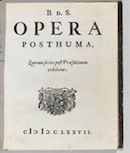
Selection from –Political Treatise - Chapter VI, of monarchy (Page 2)
Spinoza's Words – (kings rule from fear, liberty may be achieved if their power is constrained by the people)
 It is also certain, that a commonwealth is always in greater danger from its citizens than from its enemies; for the good are few. Whence it follows, that he, upon whom the whole right of the dominion has been conferred, will always be more afraid of citizens than of enemies, and therefore will look to his own safety, and not try to consult his subjects' interests, but to plot against them, especially against those who are renowned for learning, or have influence through wealth.
It is also certain, that a commonwealth is always in greater danger from its citizens than from its enemies; for the good are few. Whence it follows, that he, upon whom the whole right of the dominion has been conferred, will always be more afraid of citizens than of enemies, and therefore will look to his own safety, and not try to consult his subjects' interests, but to plot against them, especially against those who are renowned for learning, or have influence through wealth.
It must besides be added, that kings fear their sons also more than they love them, and so much the more as the latter are skilled in the arts of war and peace, and endeared to the subjects by their virtues. From all which it follows, that the more absolutely the commonwealth's right is transferred to the king, the less independent he is, and the more unhappy is the condition of his subjects.
Spinoza goes on at length detailing how a kingdom should funtion. He recomments a large and rotating council of minsters whose personal assets would held apart from in any consideration the council might take up. He also calls for an independent system for the administration of justice and for religion be free from laws unless it be a threat to overthrow the state. Places of worship should not be built with public funds.
Going beyond, for another chapter, Chapter VII, Spinoza continues his discussion of monarchy but for us it is so out of date as to be useless. He ends with...
We conclude, therefore, that the multitude may preserve under a king an ample enough liberty; if it contrive that the king's power be determined by the sole power of the multitude itself.